|
|
|
Sort Order |
|
|
|
Items / Page
|
|
|
|
|
|
|
| Srl | Item |
| 1 |
ID:
113199
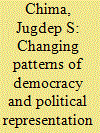

|
|
|
|
|
| Publication |
2012.
|
| Summary/Abstract |
India is the second most populous country in the world with over 1.2 billion people, and the world's "largest democracy." It is home to a bewildering number of different ethnic, religious, linguistic, caste, and cultural groups whose community boundaries are difficult to define because of both cross-cutting cleavages and overarching identities. Hindi is the country's official language of government, English has the status of "subsidiary official language," and over a dozen other languages have been officially recognized; Indian dialects number in the hundreds.
|
|
|
|
|
|
|
|
|
|
|
|
|
|
|
|
| 2 |
ID:
097024
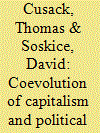

|
|
|
|
|
| Publication |
2010.
|
| Summary/Abstract |
Protocorporatist West European countries in which economic interests were collectively organized adopted PR in the first quarter of the twentieth century, whereas liberal countries in which economic interests were not collectively organized did not. Political parties, as Marcus Kreuzer points out, choose electoral systems. So how do economic interests translate into party political incentives to adopt electoral reform? We argue that parties in protocorporatist countries were "representative" of and closely linked to economic interests. As electoral competition in single member districts increased sharply up to World War I, great difficulties resulted for the representative parties whose leaders were seen as interest committed. They could not credibly compete for votes outside their interest without leadership changes or reductions in interest influence. Proportional representation offered an obvious solution, allowing parties to target their own voters and their organized interest to continue effective influence in the legislature. In each respect, the opposite was true of liberal countries. Data on party preferences strongly confirm this model. (Kreuzer's historical criticisms are largely incorrect, as shown in detail in the online supplementary Appendix.)
|
|
|
|
|
|
|
|
|
|
|
|
|
|
|
|
| 3 |
ID:
140463
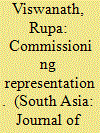

|
|
|
|
|
| Summary/Abstract |
Commissions of inquiry are unique tools of modern governance that represent ‘the people’, but in a manner quite unlike parliaments and other forms of elected political representation. Using as its example the 2007 Misra Report, this paper reveals how, in the production of a commission report, scores of non-state actors—‘stakeholders’ from a wide range of social strata—are enlisted to produce the policies that will then redound upon those very stakeholders. In thus consulting the people and eliciting their speech, commissions serve to publicly enact, in a controlled setting, the deliberative ideal of democracy that is otherwise absent in India. In this particular instance, the problematic status of Dalits is subsumed under the normative religious identity of the post-colonial Indian nation, a conclusion whose emergence through reasoned debate is publicly enacted in the form of the commission.
|
|
|
|
|
|
|
|
|
|
|
|
|
|
|
|
| 4 |
ID:
112496
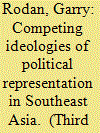

|
|
|
|
|
| Publication |
2012.
|
| Summary/Abstract |
In both post-authoritarian and authoritarian regimes in Southeast Asia there are continuing struggles over the forms and extent of political representation. Importantly, many of the same ideologies are present across these different categories of regime. Ideas of, and constituencies for, non-democratic representation exist in democratic societies and vice versa. Alongside democratic notions of representation, populist, localist and consensus rationales compete for support. However, in contests to shape political representation, historical factors, including legacies of the Cold War and structural impacts of global capitalist development, are not favourable to the pursuit of interests through the independent, collective action-especially cohesive social movements involving trade unions-that characterised the experiences of democratisation in Western Europe. This profoundly influences the complexion of and levels of support for different ideologies of representation in the region.
|
|
|
|
|
|
|
|
|
|
|
|
|
|
|
|
| 5 |
ID:
148768
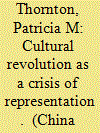

|
|
|
|
|
| Summary/Abstract |
The May 16 Notification, which set the agenda for the Cultural Revolution, named the movement's key targets as those “representatives of the bourgeoisie who have sneaked into the Party, the government, the army, and all spheres of culture.” The ensuing uprising of students and workers, many of whom claimed to be the loyal “representatives” of revolutionary and radical forces at the grassroots of society, exposed the fulminating crisis of political representation under CCP rule. This article considers the Cultural Revolution as a manifestation of a continuing crisis of representation within revolutionary socialism that remains unresolved to the present day, as demonstrated by the tepid popular response to Jiang Zemin's “three represents” and widespread contemporary concerns about the Party's “representativeness” (daibiaoxing 代表性) in the wake of market reform. Although the Cultural Revolution enabled both public debate of and political experimentation with new forms of representative politics, the movement failed to resolve the crisis. The Party's lingering disquiet regarding issues of representation thus remains one legacy of the Cultural Revolution.
|
|
|
|
|
|
|
|
|
|
|
|
|
|
|
|
| 6 |
ID:
178426
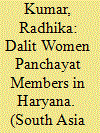

|
|
|
|
|
| Summary/Abstract |
Drawing on the latest round of elections to Panchayati Raj Institutions in the state of Haryana in 2016, this article interrogates the substantial increase in the number of Dalit women representatives, based on fieldwork in a specific village. Since both Dalit and non-Dalit women present narratives of non-participation in the functioning of the village panchayat, it is argued that the increase in Dalit women representatives was not by design, but by default, due to an amendment of the Haryana Panchayati Raj Act 2015. Overall, in the studied village, women continue to remain marginalised in the local representative bodies, and gender-based quotas have only ensured numerical visibility of women.
|
|
|
|
|
|
|
|
|
|
|
|
|
|
|
|
| 7 |
ID:
125258
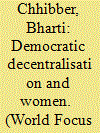

|
|
|
|
|
| Publication |
2013.
|
| Summary/Abstract |
For democratic decentralization it is pertinent that democracy is seen as a broad participatory process in which citizens at the grass-root level take part directly in decisions affecting them, their community and their work. Though women form a sizable part of any country's population, their political representation and participation is definitely below the mark. Through the 73rd Constitutional amendment, India moved towards a big change in institutional framework of governance with 33% reservation for women at the local level i.e. panchayats. However, there are structural and procedural bottlenecks still to be taken care of including poverty, lack of education, patriarchal mode of society, lack of financial independence and lack of awareness of political rights which hamper women's ability to take independent decisions.
|
|
|
|
|
|
|
|
|
|
|
|
|
|
|
|
| 8 |
ID:
129989
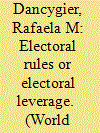

|
|
|
|
|
| Publication |
2014.
|
| Summary/Abstract |
Immigration has fundamentally altered the ethnic and religious makeup of most advanced democracies, but substantial variation is observed in the political representation of immigrant-origin minority groups across countries and cities. Though existing research has highlighted the role of electoral institutions in explaining minority representation, it is often difficult to isolate their effects across contexts. Focusing on Muslims in England and employing a new data set containing over 42,000 candidate-level observations, this article explains Muslim candidate election and selection. To do this, the author makes use of a rule change whereby a subset of localities switched from the use of multimember elections to the use of single-member elections. She finds that these electoral rules have no significant effect on the share of Muslims that gets elected but that they do influence the selection process: in a given election, Muslims are half as likely to be selected when only one seat is up for election as compared with when three seats are in play. Yet parties balance the slate across consecutive single-member elections, leading to similar results across systems. Further, the more undesirable the seat, the more likely it is to have a Muslim on the ticket, but this effect holds only in single-member elections, and it reverses as Muslims gain electoral leverage. Overall electoral leverage proves crucial: the effect of institutions and the potential for institution-based discrimination are conditional on the size and concentration of the local Muslim population and the votes it can deliver at both the election and the selection stages.
|
|
|
|
|
|
|
|
|
|
|
|
|
|
|
|
| 9 |
ID:
107295
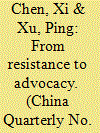

|
|
|
|
|
| Publication |
2011.
|
| Summary/Abstract |
Although many state agencies in China are designated with a function of "representing" ordinary people's interests, they are poorly structured for that purpose. It is therefore puzzling why some of them have at times actively and effectively advocated the interests of ordinary people, even when such interests may conflict with state policies. To solve this puzzle, this article examines a recent campaign by the Chinese Disabled Persons Federation to resist a national trend to ban the use of three-wheelers for passenger transport by many local governments. Our analysis recognizes the importance of personal motivations and favourable political structure, but it emphasizes that forceful popular collective action can create both pressure and opportunity for active state advocacy. Such a pattern of mutual-reinforcement between mass organizations and their constituency has sometimes contributed to the dynamics of political change in the reform era.
|
|
|
|
|
|
|
|
|
|
|
|
|
|
|
|
| 10 |
ID:
130491
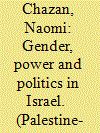

|
|
|
|
|
| Publication |
2011.
|
| Summary/Abstract |
The story of women, politics and power in Israel is fraught with anomalies. Women have traditionally been active participants in the public sphere, but their power has been consistently constrained. They have suffered from systematic underrepresentation, but as their number in the formal political arena has grown, their substantive impact has waned. And while they have scored significant achievements, gender inequality endures. Never have these inherent contradictions been more apparent than during the past decade, when the rising political clout of women has not been translated into sustained power, their increased political presence into effective influence, or their tangible legislative gains into significant socioeconomic progress. These trends highlight not only the ongoing impact of chauvinistic, militaristic and particularistic strains on Israeli politics in general and the depth of the recent move to the right in particular, but also the innovative potential of gender-rooted alternatives
|
|
|
|
|
|
|
|
|
|
|
|
|
|
|
|
| 11 |
ID:
118969


|
|
|
|
|
| Publication |
2013.
|
| Summary/Abstract |
Particularistic spending, a large literature argues, builds support for incumbents. This literature equates money spent in the district with the credit constituents allocate. Yet, constituents lack the necessary information and motivation to allocate credit in this way. We use extensive observational and experimental evidence to show how legislators' credit claiming messages-and not just money spent in the district-affect how constituents allocate credit. Legislators use credit claiming messages to influence the expenditures they receive credit for and to affect how closely they are associated with spending in the district. Constituents are responsive to credit claiming messages-they build more support than other nonpartisan messages. But contrary to expectations from other studies, constituents are more responsive to the total number of messages sent rather than the amount claimed. Our results have broad implications for political representation, the personal vote, and the study of U.S. Congressional elections.
|
|
|
|
|
|
|
|
|
|
|
|
|
|
|
|
| 12 |
ID:
160563
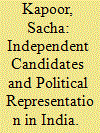

|
|
|
|
|
| Summary/Abstract |
We estimate the causal effect of independent candidates on voter turnout and election outcomes in India. To do this, we exploit exogenous changes in the entry deposit candidates pay for their participation in the political process, changes that disproportionately excluded candidates with no affiliation to established political parties. A one standard deviation increase in the number of independent candidates increases voter turnout by more than 6 percentage points, as some voters choose to vote rather than stay home. The vote share of independent candidates increases by more than 10 percentage points, as some existing voters switch who they vote for. Thus, independents allow winning candidates to win with less vote share, decrease the probability of electing a candidate from the governing coalition by about 31 percentage points, and ultimately increase the probability of electing an ethnic-party candidate. Altogether, the results imply that the price of participation by independents is constituency representation in government.
|
|
|
|
|
|
|
|
|
|
|
|
|
|
|
|
| 13 |
ID:
120140
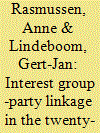

|
|
|
|
|
| Publication |
2013.
|
| Summary/Abstract |
This article systematically investigates interest group-party interactions in the Netherlands, Denmark and the United Kingdom based on cross-national surveys with responses from 1,225 interest groups. The findings show that interest groups and parties still interact in the beginning of the twenty-first century, but that the vast majority of their interaction involves a low degree of institutionalisation. Using fractional logit analysis, it is demonstrated that the strength of interest group-party linkage is primarily affected by systematic differences in state-society structures and organisational group characteristics. Moreover, differences are found in what conditions different types of interaction. Whereas historical legacies and partisan origin influence an interest group's structural party links, group resources make interactions of a less institutionalised, ad hoc nature more likely.
|
|
|
|
|
|
|
|
|
|
|
|
|
|
|
|
| 14 |
ID:
096280
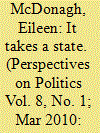

|
|
|
|
|
| Publication |
2010.
|
| Summary/Abstract |
American women attain more professional success in medicine, business, and higher education than do most of their counterparts around the world. An enduring puzzle is, therefore, why the US lags so far behind other countries when it comes to women's political representation. In 2008, women held only 16.8 percent of seats in the House of Representatives, a proportion that ranks America lower than 83 other countries. This article addresses this conundrum. It establishes that equal rights alone are insufficient to ensure equal access to political office. Also necessary are public policies representing maternal traits that voters associate with women. Such policies have feedback effects that teach voters that the maternal traits attributed to women represent strengths not only in the private sphere of the home but also in the public sphere of the state. Most other democracies now have such policies in place, but the United States lacks such policies, which accounts for its laggard status with regard to the political representation of women.
|
|
|
|
|
|
|
|
|
|
|
|
|
|
|
|
| 15 |
ID:
147247
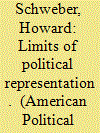

|
|
|
|
|
| Summary/Abstract |
A representation is always a selective and limited reproduction of the thing represented, an idea captured in the metaphor of a map. What is left out of a representation is as important as what is included. A specifically political conception of representation implies limits to the scope of that conception, the nature and character of the represented constituency, and the relationship between constituent and representative, irrespective of variations in institutional design and practice. The limits of political representation reflect normative commitments; consequently, a focus on those limits is central to an evaluation of representative practices. While it is important to look beyond familiar institutional forms, excessively inclusive descriptions of “representative,” “constituency,” or “representation” deprive those conceptions of their substantive content. The limits of political representation are not defects to be overcome by an ever-expanding definition of representation, they are an essential focus in the normative or empirical analysis of representative institutions and practices.
|
|
|
|
|
|
|
|
|
|
|
|
|
|
|
|
| 16 |
ID:
144804
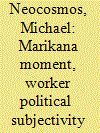

|
|
|
|
|
| Summary/Abstract |
The flag suits the filthy landscape, and our jargon drowns the sound of the drum.
In the interior we shall nourish the most cynical prostitution. We shall massacre all logical revolts. To the spicy, softened countries! – At the service of the most monstrous industrial or military exploitation. Until we meet again; here, no matter where. Conscripts of our good will, we shall have a ferocious philosophy; ignorant of science, cunning for comfort; let the rest of the world perish. This is the real way forward; full march ahead! (Rimbaud, 1986)
|
|
|
|
|
|
|
|
|
|
|
|
|
|
|
|
| 17 |
ID:
184127
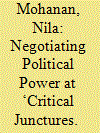

|
|
|
|
|
| Summary/Abstract |
From a feminist institutionalist perspective, this article engages in a comparative analysis of South Africa, one of the only post-transition democracies where women organized as a distinct interest group representing gender interests were able to negotiate and gain access to political power, and India, where women’s participation was predominantly as ‘nationalist women’. It argues that constitution drafting is a decisive critical juncture when descriptive representation can be translated very effectively into the substantive representation of women as equal citizens, provided women qua women and as gender-conscious agents are able to intervene to promote the cause of their effective political participation.
|
|
|
|
|
|
|
|
|
|
|
|
|
|
|
|
| 18 |
ID:
172654


|
|
|
|
|
| Summary/Abstract |
In this article, we join an ongoing debate among Western scholars on political representation and argue that political representation is undergoing a transformation stimulated by the rapid proliferation of the new information and communication technologies. We propose that in China, the new social media have stimulated a shift from representation by official organizations to bottom-up self-representation, and from mandate political representation to embodiment. To grasp this change, we select private entrepreneurs as our focus of study and propose the concept of “connective representation.” Drawing on fieldwork in China from 2015 through 2019 and on analysis of online materials, we demonstrate how private entrepreneurs in China form and advance their collective interests through online connectivity. The concept of connective representation adds to the conventional perspectives on political representation, particularly in the authoritarian setting.
|
|
|
|
|
|
|
|
|
|
|
|
|
|
|
|
| 19 |
ID:
128072
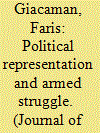

|
|
|
|
|
| Publication |
2014.
|
| Summary/Abstract |
In 1974, both the Arab League and the United Nations recognized the Palestine
Liberation Organization (PLO) as the "sole, legitimate representative of the
Palestinian people." This article explores the dynamic history of the PLO's
methods of political representation from its establishment in 1964 through the
height of the armed struggle in the mid-seventies. Contrasting fedayee theories
of political representation with their practice, the author draws upon a range
of ideological documents produced by different guerrilla factions, as well as
accounts from prominent actors in the movement.
|
|
|
|
|
|
|
|
|
|
|
|
|
|
|
|
| 20 |
ID:
145490
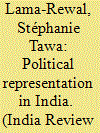

|
|
|
|
|
| Summary/Abstract |
Democratic theory has recently been marked by a renewed interest in political representation that is manifest in, and proceeds from, a series of theoretical works that radically open up the concept of representation. This introductory article briefly presents some of the key theoretical propositions that are brought forward by this body of literature, but also by anthropological works on South Asia, namely (i) the intrinsic plurality of the meanings and forms of political representation; (ii) the centrality and pervasiveness of representation processes in political life; and (iii) the constructivist dimension of political representation. As I introduce the four papers in this Special Issue, which collectively demonstrate the heuristic value of an engagement with such debates to understand contemporary Indian politics, I insist that what is at stake is not so much a “crisis” of political representation as a series of events and evolutions that question received knowledge about political representation in India.
|
|
|
|
|
|
|
|
|
|
|
|
|
|
|
|
|
|
|
|
|